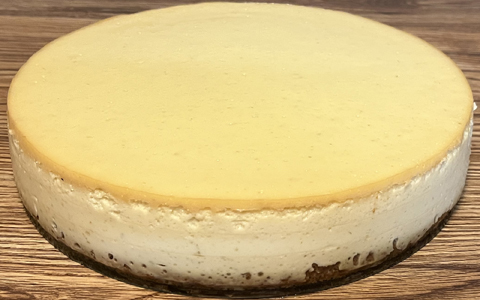|
|
 |
Baked Key Lime Cheesecake—Prototype 2:
3-Cheese Blend (1CT-1NC-1YG):
Prepare ahead of time 16 ounces of yogurt cheese, derived from one 32-ounce
container of nonfat yogurt. If the resulting yogurt cheese falls below 16
ounces, add back enough of the whey (that was strained out from the yogurt) to
make up the difference. To this yogurt cheese combine 16 ounces of whipped,
lowfat cottage cheese and 16 ounces (two 8-ounce packages) of softened
Neufchatel cheese ("light cream cheese").
Grease a 9 1/2" (or 9") springform pan, but do not wrap foil around
it yet (see below).
Crust:
2 oz. melted, white chocolate
8 oz. (1 cup) 3-cheese blend (see above)
1/4 cup granulated sugar
1/4 cup brown sugar
1/2 teaspoon vanilla
2 oz. All-Bran, ground up
Place the resulting mixture in the greased pan and pre-bake without tub at 300
degrees for 30 minutes, then cool enough to comfortably touch at least the pan's
upper sidewall.
Batter:
1 1/4 cups granulated sugar
40 oz. (5 cups) 3-cheese blend (see above)
2 teaspoons vanilla
1/3 cup key lime juice
1 tablespoon grated key lime zest (peel)
14-ounce can of sweetened condensed milk
2 teaspoons xanthan gum
6 eggs (brown recommended, large)
Expect close to 8 1/2 cups of the resulting batter, but do not add this to
the pan all at once. Rather, this needs to be done in four installments.
Wrap the pan in foil just before adding the first batter installment (to minimize
the foil's disturbance and therefore its leakage risk, do not put it on any
earlier).
For each of the first three installments, gently scoop about 2 1/2 cups of
batter into the pan, fully covering the surface (here's a tip—scoop small
amounts of batter around the edge of the pan, letting this batter flow towards
the middle on its own), and then bake this pan with its contents for 25 minutes,
at 325 degrees. However, at the end of the third installment's 25 minutes, add
on another 10 minutes of baking time, but only at 300 degrees (that's a 35
minute "baking installment"—the first 25 minutes at 325 degrees
and the next 10 at 300). For these three installments here, bake with the pan in
a tub filled with at least 1/4 to 1/2 inch of boiling water, but (to reduce
spillage risks) do not fill the tub all the way at this point, because the whole
tub-and-pan assembly is going to need to be removed from the oven (in order to
comfortably add contents to the pan) between installments.
After these first three installments are done, there should be about 1 cup of
batter left, with 85 minutes of baking time reached at this point (25 minutes
for each of the first two installments, and 35 for the third one). Now comes the
fourth installment—carefully add the last of this batter on top of the
pan's earlier installments, fully coating the entire surface. Next, return the
entire pan-and-tub assembly to the oven, with the temperature remaining at 300
degrees. At this point, fill up the tub generously with boiling water. Resume
baking for another 75 minutes (based upon usage of a 9 1/2" pan).
Afterward, shut the oven off, and leave its door slightly ajar, with the
cheesecake still inside—and in the tub—for an hour. Next, remove the
cheesecake from the oven and tub. Continue to cool it down at room temperature
for another two hours. After doing so, remove the cheesecake from pan and
refrigerate.

|
|

|

